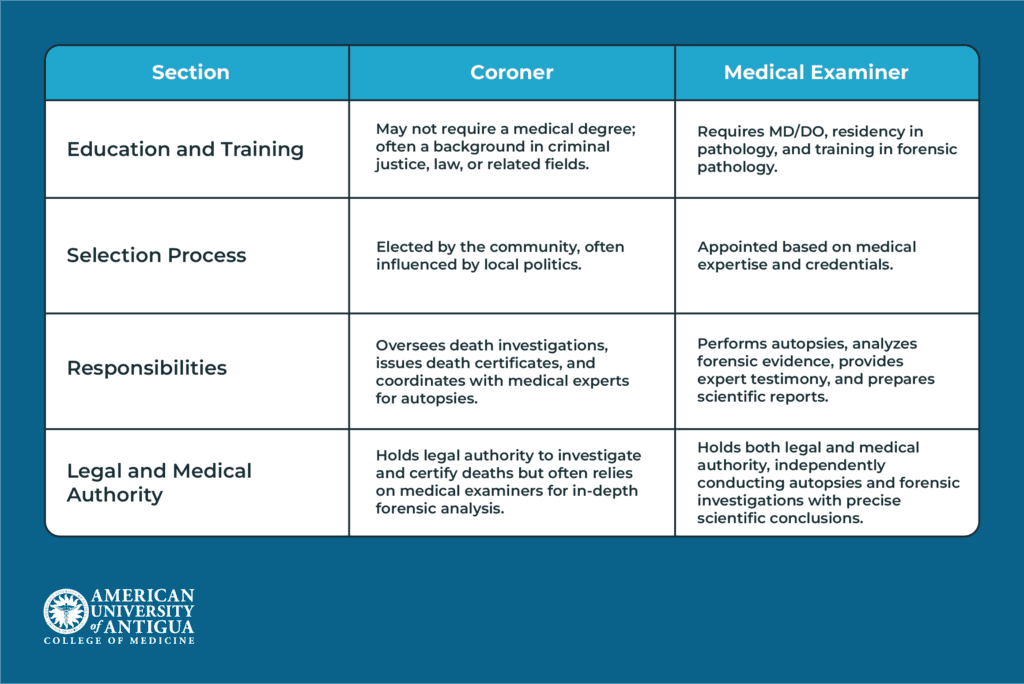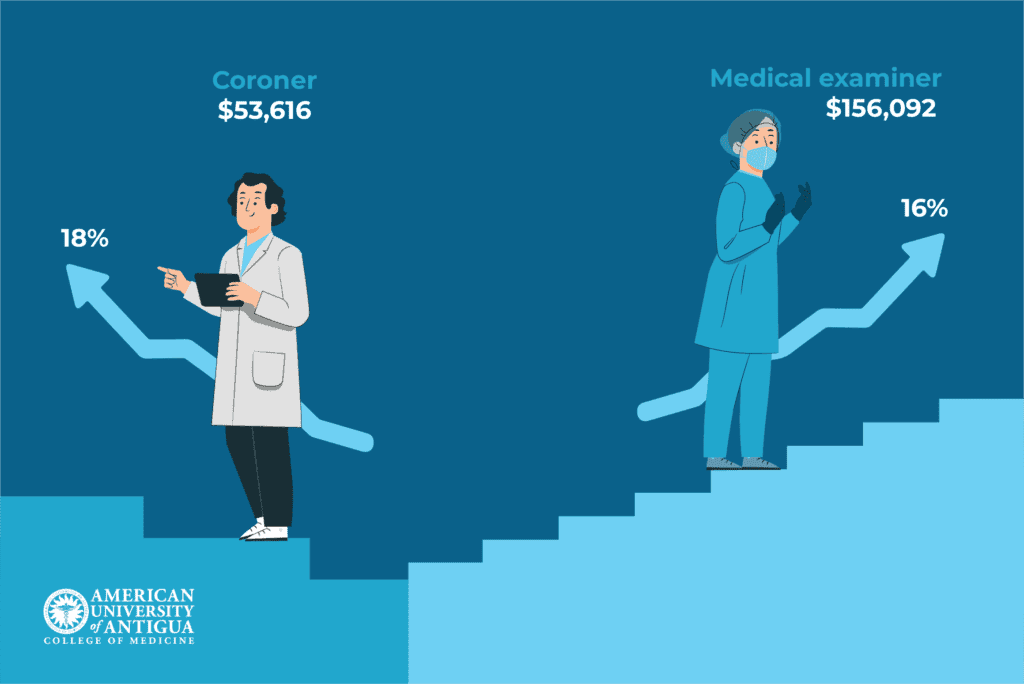Key Differences Between a Coroner and a Medical Examiner
Medical examiners, requiring advanced medical training, focus on autopsies and medical investigations, while coroners handle legal duties, often without medical expertise, with medical examiners enjoying higher demand and salaries for their specialized skills.
When it comes to death investigations, the roles of coroner and medical examiners are often compared, but they bring unique expertise to the table. While both positions contribute significantly to justice and public health, their responsibilities, qualifications, and methods vary.
✅ Request information on AUA's MD program TODAY!
YOUR PATH TO SUCCESS BEGINS HERE
Understanding these differences can help clarify their unique contributions to the investigative process, whether through legal or medical expertise. So, come along as we uncover what sets these roles apart.
What Is a Coroner?
A coroner is an official responsible for investigating deaths, particularly those that are sudden, unexplained, or suspicious. They play a key role in determining the cause and manner of death.
The primary responsibilities of a coroner include:
- Overseeing investigations into deaths, especially when they are unusual or unclear.
- Determining the cause of death (e.g., disease, injury, or poisoning) and the manner of death (e.g., natural, accidental, suicide, or homicide).
- Certifying death certificates, confirming the official cause of death for legal and medical purposes.
Coroners typically handle cases where:
- Deaths occur unexpectedly or under unusual circumstances.
- There are signs of violence or foul play, such as homicide or accidental death.
- Deaths are suspicious, unclear, or require further examination, like overdoses or unexplained injuries.
Their investigations may involve autopsies, interviews, and reviewing medical records to provide clarity on the death.
What Is a Medical Examiner?
A medical examiner is a licensed physician with specialized training in forensic pathology who is responsible for investigating deaths, particularly those that are sudden, unexplained, or suspicious. They play a critical role in determining the cause of death and supporting legal investigations.
The main responsibilities of a medical examiner include:
- Performing autopsies to examine the body and identify the cause of death.
- Determining the medical cause of death, such as disease, trauma, or poisoning.
- Analyzing forensic evidence, including tissue samples, fluids, and other materials, to support investigations into suspicious or complex cases.
- Providing expert testimony in court regarding their findings and conclusions.
Medical examiners typically handle cases such as:
- Homicides, where the cause of death needs to be determined for criminal investigations.
- Accidental deaths, like car accidents or falls, where the circumstances must be examined.
- Unexplained deaths, including those from drug overdoses or sudden illness, where more information is needed to understand the cause.
Their work is vital to both criminal justice and public health, as they help uncover the truth behind deaths and contribute to legal proceedings and investigations.
Key Differences Between a Coroner and a Medical Examiner
A coroner and a medical examiner are two distinct roles, each responsible for investigating deaths but with different qualifications and duties.
Education and training
The training and qualifications for coroners and medical examiners differ significantly, reflecting their distinct roles.
Coroners are often elected officials and may not need a medical degree or formal forensic training. In many areas, the minimum qualifications include a background in criminal justice, law, or a related field, though requirements vary by region.
Medical examiners, on the other hand, must hold a medical degree (MD or DO) and complete extensive specialized training. This typically includes graduating from medical school, completing a residency in pathology, and undergoing further training in forensic pathology.
Selection process

The processes for selecting coroners and medical examiners are also different, which emphasizes this distinction.
Coroners are typically chosen through elections in most regions, allowing community members to vote for candidates. This election-based process often ties the role to local politics and public opinion.
In contrast, medical examiners are appointed by government agencies or medical boards. This selection process is based on their medical credentials and specialized training in forensic pathology.
Responsibilities
Coroners and medical examiners both play essential roles in death investigations, but their duties are widely different due to their qualifications.
Coroners are primarily responsible for overseeing the administrative and legal aspects of death investigations. Their key duties include:
- Determining the cause and manner of death based on available evidence, though they may rely on medical professionals for autopsies.
- Signing and issuing death certificates.
- Supervising death inquiries, especially in cases of sudden, unexplained, or suspicious deaths.
- Managing legal and administrative tasks, such as coordinating with law enforcement, notifying next of kin, and authorizing the release of remains.
Coroners may not have medical expertise, which limits their ability to conduct in-depth forensic analyses. Instead, their role often involves oversight and coordination.
Medical examiners, as trained forensic pathologists, take on highly technical responsibilities, such as:
- Performing autopsies to determine the cause and manner of death.
- Conducting toxicology tests and analyzing tissue samples.
- Examining forensic evidence from crime scenes.
- Preparing detailed medical reports and providing expert testimony in court.
Their medical background allows them to focus on scientific and forensic aspects of death investigations, offering more precise and evidence-based conclusions than coroners.
Legal and medical authority
Medical examiners have more medical authority than coroners because of their qualified education, whereas both roles have legal authority.
Coroners hold legal authority to investigate deaths and determine the cause and manner of death. In many jurisdictions, they can certify deaths and issue death certificates. Their authority is primarily legal and administrative, often tied to jurisdictional powers granted by local or state law.
Since coroners may lack medical training, they frequently rely on forensic pathologists or medical examiners to perform autopsies and provide detailed medical assessments. This distinction means coroners serve as coordinators of the death investigation process rather than as medical experts.
Medical examiners possess both legal and medical authority, allowing them to perform autopsies, conduct forensic analyses, and determine the cause and manner of death independently. Their extensive medical training equips them to produce detailed medical reports, which are legally binding and often used in court proceedings.
Medical examiners are typically appointed based on their expertise in forensic pathology, enabling them to handle both the scientific and legal aspects of death investigations with precision.
How Coroners and Medical Examiners Work Together
Coroners and medical examiners often collaborate in death investigations, particularly when their roles overlap.
In cases where a coroner is responsible for overseeing the investigation but lacks medical expertise, they may seek assistance from a medical examiner for tasks requiring specialized knowledge. This includes performing autopsies, conducting toxicological analyses, and interpreting forensic evidence.
Medical examiners provide critical input in complex or suspicious cases, such as homicides or unexplained deaths, offering detailed medical findings that help determine the cause and manner of death. Coroners, leveraging their legal authority, integrate this information into the broader investigation, ensuring compliance with jurisdictional regulations.
This partnership is crucial in high-profile or criminal cases where accurate and comprehensive death determinations are essential.
Salary and Career Outlook for Coroners and Medical Examiners

Driven by the consistent need for death investigations, the demand for coroners and medical examiners is expected to grow by 16% for medical examiners and 18% for coroners by 2028.
Coroners typically earn an annual average salary of $53,616, though this varies by jurisdiction and is influenced by local government budgets. Medical examiners, on the contrary, can expect up to $156,092 due to their specialized forensic pathology training.
Both roles play crucial parts in the medicolegal system, but the additional medical qualifications of medical examiners often lead to greater earning potential and demand in forensic-intensive regions.
Which Career Path Is Right for You?
When considering a career as a coroner or medical examiner, think about your interests and aspirations.
The coroner path offers variety, focusing on legal and administrative responsibilities, often tied to community needs and governance. On the other hand, becoming a medical examiner involves extensive medical training and hands-on forensic work, suited for those with a passion for science and investigation.
Your career satisfaction will depend on your educational background and willingness to meet each role’s qualifications. Coroners may require fewer years of formal training, while medical examiners must complete medical school and specialized pathology training.
Reflect on what excites you more—legal oversight or medical expertise—and explore job opportunities aligned with your goals and skills.
Conclusion
Coroners and medical examiners are essential to death investigations, offering distinct but complementary skills. Coroners focus on legal and administrative duties, while medical examiners, with their advanced forensic pathology training, handle technical analyses like autopsies. Demand for both roles is steady, with medical examiners often earning higher salaries due to their specialized expertise.
Both careers are critical to the justice system and public health, ensuring accurate death determinations and supporting legal processes. Whether you prefer legal oversight or scientific investigation, each role provides a meaningful way to contribute to society.
Frequently Asked Questions (FAQs):
How long does it take to become a coroner?
The timeline to become a coroner varies but typically requires 4-6 years of education and experience, often including a degree in criminal justice, law, or a related field, and on-the-job training depending on the jurisdiction.
Can a medical examiner perform autopsies outside of death investigations?
Yes, medical examiners may perform autopsies outside of death investigations, such as for educational purposes, private cases, or medical research, depending on their jurisdiction and institutional policies.
✅ Request information on AUA's MD program TODAY!